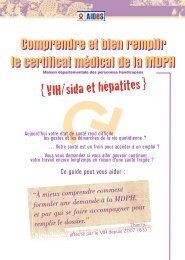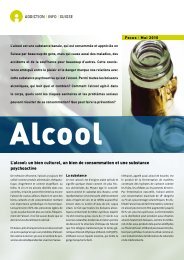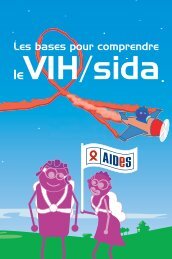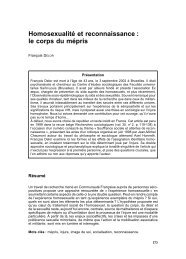<strong>Care</strong> <strong>and</strong> <strong>support</strong> <strong>for</strong> <strong>people</strong> <strong>living</strong> <strong>with</strong> <strong>HIV</strong>/<strong>AIDS</strong>to be taken by health workers in the h<strong>and</strong>ling of body fluids. Other imperatives comeunder the general heading of health policy, such as the licensing of nurses or otherpractitioners to prescribe morphine, <strong>and</strong> the regulation of the supply of drugs(including antiretrovirals) in order to minimize the risk of drug resistance <strong>and</strong> counterfeiting.Where an intermediate care <strong>and</strong> <strong>support</strong> package is feasible, one would expect thatprevention activities requiring intermediate levels of technical <strong>and</strong> human resourceswould also be available. These include measures aimed at reducing mother-to-childtransmission of <strong>HIV</strong>, <strong>and</strong> antiretroviral treatment to prevent <strong>HIV</strong> infection in healthcare workers who have been exposed occupationally to the virus (post-exposureprophylaxis).Improve access to drugsImproving access to drugs of special interest to <strong>people</strong> <strong>living</strong> <strong>with</strong> <strong>HIV</strong> infection is apriority strategy <strong>for</strong> UN<strong>AIDS</strong>, <strong>and</strong> is currently mobilizing much interest worldwide.Making drugs more accessible requires a broad look at the underlying reasons <strong>for</strong>poor access. One factor is the cost of drugs. Another is inadequate in<strong>for</strong>mationabout the drugs needed to manage <strong>HIV</strong>-related illnesses. Finally, drug access ishampered by the poor capacity of health systems in developing countries to select<strong>and</strong> use drugs in a rational manner, to monitor patients’ progress <strong>and</strong> side-effects,<strong>and</strong> to manage their drug supply. This is linked in turn to inadequate financing of thehealth system in general <strong>and</strong> of the drug supply in particular.In the current context, attention has mainly focused on drug prices, <strong>and</strong> in particularthe price of antiretroviral drugs still under patent in high-income countries, whichmakes them financially inaccessible to most <strong>people</strong> <strong>with</strong> <strong>HIV</strong>. However, <strong>for</strong> the reasonsmentioned above, <strong>people</strong> <strong>with</strong> <strong>HIV</strong> also have inadequate access to the “essentialdrugs” <strong>for</strong> treating <strong>HIV</strong>-related illness, including drugs that are no longer underpatent. The poor availability of drugs <strong>for</strong> pain relief or respiratory distress <strong>and</strong> <strong>for</strong> thetreatment of many <strong>HIV</strong>-related diseases found in a survey of university teaching hospitalsshows how inadequate this access is, even at the highest echelon of the healthsystem (see page 89). Another indicator of inadequate drug access is the limitedcoverage of tuberculosis programmes, which, according to WHO, manage to diagnose<strong>and</strong> treat only around 40% of TB cases. Overall, WHO estimates that accessto essential drugs <strong>for</strong> health conditions of all kinds is guaranteed <strong>for</strong> only 50% of thepopulation in developing countries.Through collaboration between the UN<strong>AIDS</strong> Secretariat, WHO <strong>and</strong> UNICEF, some ofthe obstacles to essential drug access are being tackled. First, beginning in 1997,15 new drugs of interest to <strong>people</strong> <strong>with</strong> <strong>HIV</strong> were included in the WHO Model List ofEssential Drugs. The next step was to pinpoint the reason why most wholesalers ofgeneric drugs were not distributing the newly included drugs, <strong>and</strong> why even several99
Report on the global <strong>HIV</strong>/<strong>AIDS</strong> epidemic – June 2000important older drugs were rarely on offer. Working <strong>with</strong> WHO <strong>and</strong> UNICEF, theSecretariat identified manufacturers <strong>and</strong> prices <strong>for</strong> 44 essential drugs whose procurementwas being hampered by insufficient in<strong>for</strong>mation on cost <strong>and</strong> availability.This in<strong>for</strong>mation has been posted on the UN<strong>AIDS</strong>, UNICEF <strong>and</strong> WHO websites along<strong>with</strong> an offer to assist countries in locating generic drug suppliers <strong>and</strong> organizingdrug procurement. In<strong>for</strong>mation of this kind is also used to help convince plannersthat it is feasible to include <strong>HIV</strong> care <strong>and</strong> <strong>support</strong> in national strategic plans on<strong>HIV</strong>/<strong>AIDS</strong>.Strategies <strong>for</strong> cost <strong>and</strong> price reductionOne of the lessons learnt from the UN<strong>AIDS</strong> Drug Access Initiative in Côte d’Ivoire<strong>and</strong> Ug<strong>and</strong>a (see Box 19, page 103) is that, <strong>with</strong> determination <strong>and</strong> good will, it ispossible to negotiate a significant reduction in drug prices <strong>and</strong> improve the deliveryof health care. End-user prices of antiretroviral drugs in both Côte d’Ivoire <strong>and</strong>Ug<strong>and</strong>a decreased after negotiation <strong>with</strong> the pharmaceutical companies holding thepatents on those drugs. The companies that participated in the initiative eitherdonated a percentage of the drugs or agreed to sell them at a reduced price. Similardecreases in drug prices were achieved through a national drug access initiativeconducted in Senegal.Price reductions can be achieved through avenues other than negotiation <strong>with</strong>patent holders. One strategy is to produce or import generic alternatives to proprietarydrugs. UN<strong>AIDS</strong>’ analysis of the patent situation of <strong>HIV</strong>-related drugs <strong>with</strong> WHO<strong>and</strong> UNICEF has shown that most proprietary drugs used in the treatment of <strong>people</strong><strong>with</strong> <strong>HIV</strong> are not patent-protected in the majority of developing countries.Table 2 shows the prices of proprietary antiretrovirals in the USA, Côte d’Ivoire <strong>and</strong>Ug<strong>and</strong>a, <strong>and</strong> some generic equivalents in Brazil <strong>and</strong> Thail<strong>and</strong>. The lower price ofgeneric products is partly explained by the lack, or low level, of investment inresearch <strong>and</strong> development by the manufacturers.100











